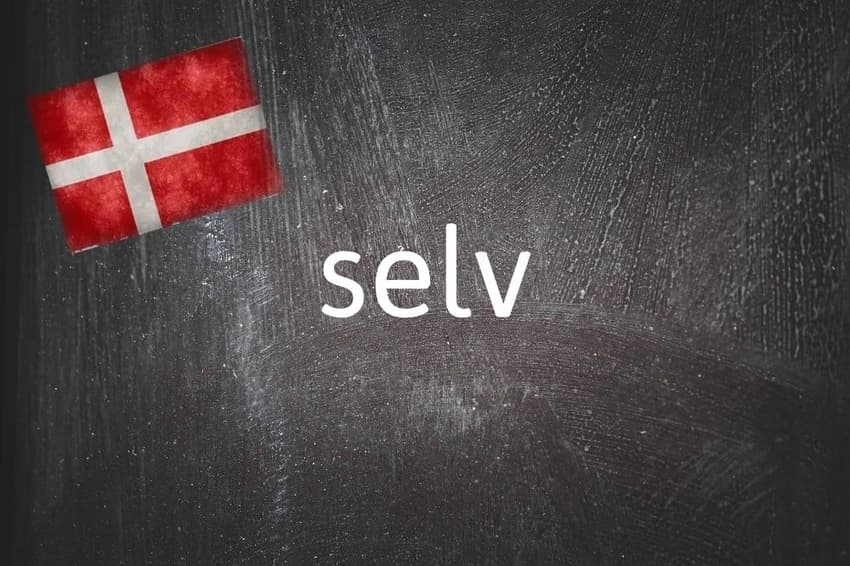Danish word of the day: Selv

Photo by Francesco Ungaro on Unsplash and Nicolas Raymond/FlickR
Today's Danish word can help you talk about independence and solitude, as well as make a pithy comeback.
What is selv?
Without sounding too philosophical, the word selv means “self”, as in han gjorde det selv (he did it himself), selv kan jeg bedst lide foråret (I personally prefer spring), hvad synes du selv (what do you think yourself?) or, as parents of small Danish children will know too well, jeg kan selv! ("I can do it myself!").
Selv can also mean “alone” – not necessarily implying that the speaker is feeling lonely – such as jeg er hjemme selv (“I am home alone”) or jeg tog i biografen selv (“I went to the cinema on my own”). If you’re feeling lonely, you should instead say jeg føler mig ensom.
Why do I need to know selv?
It appears in several compound words, such as selvisk (selfish), selvbehersket (restrained, or more literally in control of oneself) or selvsikker (self-confident).
A trickier word to explain is selveste, a kind of superlative version of selv.
Selveste can also mean him or herself, but think of it as a more extreme version, implying that the speaker has some sort of reaction to the person in question, perhaps they’re impressed or shocked. Other translations can be “in the flesh” or “none other than”.
For example: jeg vendte mig om og så stod selveste kongen lige der (“I turned around and the King himself was standing right there”) or de vandt mod selveste Barcelona (“They won against none other than Barcelona”).
It is also used as a retort or comeback, probably most commonly during frikvarterer (school breaktimes).
For example, if someone says du er doven (“you are lazy”) you can return the remark du kan selv være doven. This literally means “you can be lazy yourself” but is more like saying “I’m not lazy, you are” or something to that effect.
This phrasing can be used in a more absurd way if your sense of humour has a surreal lean. If someone says du spiser altid pizza (“you’re always eating pizza”) and you want to reject this but don’t wish to get into specifics, you could choose to dismiss it with the nonsensical du kan selv være en pizza! (“you’re a pizza”).
Comments
See Also
What is selv?
Without sounding too philosophical, the word selv means “self”, as in han gjorde det selv (he did it himself), selv kan jeg bedst lide foråret (I personally prefer spring), hvad synes du selv (what do you think yourself?) or, as parents of small Danish children will know too well, jeg kan selv! ("I can do it myself!").
Selv can also mean “alone” – not necessarily implying that the speaker is feeling lonely – such as jeg er hjemme selv (“I am home alone”) or jeg tog i biografen selv (“I went to the cinema on my own”). If you’re feeling lonely, you should instead say jeg føler mig ensom.
Why do I need to know selv?
It appears in several compound words, such as selvisk (selfish), selvbehersket (restrained, or more literally in control of oneself) or selvsikker (self-confident).
A trickier word to explain is selveste, a kind of superlative version of selv.
Selveste can also mean him or herself, but think of it as a more extreme version, implying that the speaker has some sort of reaction to the person in question, perhaps they’re impressed or shocked. Other translations can be “in the flesh” or “none other than”.
For example: jeg vendte mig om og så stod selveste kongen lige der (“I turned around and the King himself was standing right there”) or de vandt mod selveste Barcelona (“They won against none other than Barcelona”).
It is also used as a retort or comeback, probably most commonly during frikvarterer (school breaktimes).
For example, if someone says du er doven (“you are lazy”) you can return the remark du kan selv være doven. This literally means “you can be lazy yourself” but is more like saying “I’m not lazy, you are” or something to that effect.
This phrasing can be used in a more absurd way if your sense of humour has a surreal lean. If someone says du spiser altid pizza (“you’re always eating pizza”) and you want to reject this but don’t wish to get into specifics, you could choose to dismiss it with the nonsensical du kan selv være en pizza! (“you’re a pizza”).
Join the conversation in our comments section below. Share your own views and experience and if you have a question or suggestion for our journalists then email us at [email protected].
Please keep comments civil, constructive and on topic – and make sure to read our terms of use before getting involved.
Please log in here to leave a comment.